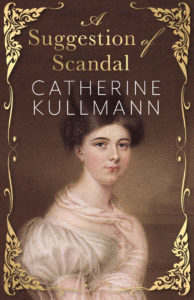 The simplest way to describe the Regency is ‘the period between hoops and crinolines’. Beautiful Empire gowns, light muslins, gentlemen in severely tailored riding clothes and highly polished boots, Mr Darcy and Elizabeth Bennet, waltzes, quadrilles and the Battle of Waterloo.
The simplest way to describe the Regency is ‘the period between hoops and crinolines’. Beautiful Empire gowns, light muslins, gentlemen in severely tailored riding clothes and highly polished boots, Mr Darcy and Elizabeth Bennet, waltzes, quadrilles and the Battle of Waterloo.
But it is so much more than that.
Although the actual Regency during which the Prince of Wales (later King George IV) acted as regent for his father, the incapacitated King George III, only lasted from 1811 to 1820, the Regency era, characterised by distinctive trends in British architecture, literature, fashions, politics, and culture could be said to cover the period from the Prince’s marriage in 1795 to the death of his successor King William IV in 1837.
The events of this significant period of European and American history still resonate after two hundred years. The Act of Union between Great Britain and Ireland of 1800, the Anglo-American war of 1812 and the final defeat of Napoleon at the Battle of Waterloo in 1815 all continue to shape our modern world.
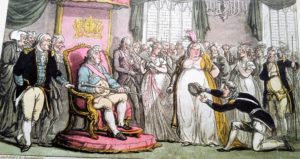 Society in the new United Kingdom was dominated by the aristocracy and great landowners who not only filled the House of Lords but also, through an unequal franchise coupled with outdated constituency borders, controlled much of the House of Commons. In The Age of Elegance, Arthur Bryant says, “Little more than 400,000 out of the English and Welsh population of 10 1/2 million enjoyed a parliamentary vote and only 4000 out of 2 million Scots”.
Society in the new United Kingdom was dominated by the aristocracy and great landowners who not only filled the House of Lords but also, through an unequal franchise coupled with outdated constituency borders, controlled much of the House of Commons. In The Age of Elegance, Arthur Bryant says, “Little more than 400,000 out of the English and Welsh population of 10 1/2 million enjoyed a parliamentary vote and only 4000 out of 2 million Scots”.
Reform was slow in coming and several times during this period Great Britain teetered on the brink of insurrection and civil war. The Habeas Corpus Acts, which required a person under arrest to be brought before a judge or into court, especially to secure the person's release unless lawful grounds are shown for their detention, were suspended regularly resulting, as one diarist noted, in ‘Many people taken up in England for Sedition & Treason’. The acts were suspended 1794 and 1798, reinstated in 1802 with the release of most of the imprisoned radicals, and suspended again in 1817.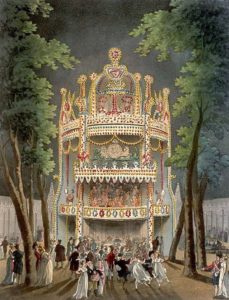 A series of ‘Gagging Acts’ sought to prevent any hint of sedition and libel. The military were used to suppress demonstrations, culminating in the infamous Peterloo massacre in 1819 when cavalry charged the crowd at a reform meeting in Manchester, leaving over four hundred injured and eleven to fifteen people dead, including a two-year-old boy.
A series of ‘Gagging Acts’ sought to prevent any hint of sedition and libel. The military were used to suppress demonstrations, culminating in the infamous Peterloo massacre in 1819 when cavalry charged the crowd at a reform meeting in Manchester, leaving over four hundred injured and eleven to fifteen people dead, including a two-year-old boy.
The long process of Catholic emancipation from the Penal Laws was completed in 1829 with the Roman Catholic Relief Act, and Catholics were finally able to take their seats in both houses of parliament. 1832 saw the beginning of political reform when the Reform Act extended the franchise to more than the select few as well as redrawing constituency borders and doing away with pocket boroughs. Some parts of the new United Kingdom were still more equal than others, however; in 1833, one in five Englishmen had the vote, one in eight Scotsmen and one in twenty Irishmen.
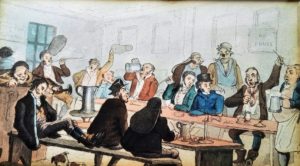 The Napoleonic wars lasted twelve years. Unlike the other combatants, the UK was spared the havoc wrought by an invading army and did not suffer under an army of occupation. The war happened elsewhere, far away. People were generally unaware of its progress—the only available news was that provided in official dispatches published in The Gazette and other newspapers and the occasional private letter that reached home. But the war had to be paid for. The unpopular income tax, which was introduced for the first time in 1798 and abolished in 1802 after conclusion of the Peace of Amiens was reintroduced in 1803 as a ‘contribution of the profits arising from property, professions, trades and offices’. Napoleon’s continental blockade depressed trade, leading to increased unemployment and rising food prices.
The Napoleonic wars lasted twelve years. Unlike the other combatants, the UK was spared the havoc wrought by an invading army and did not suffer under an army of occupation. The war happened elsewhere, far away. People were generally unaware of its progress—the only available news was that provided in official dispatches published in The Gazette and other newspapers and the occasional private letter that reached home. But the war had to be paid for. The unpopular income tax, which was introduced for the first time in 1798 and abolished in 1802 after conclusion of the Peace of Amiens was reintroduced in 1803 as a ‘contribution of the profits arising from property, professions, trades and offices’. Napoleon’s continental blockade depressed trade, leading to increased unemployment and rising food prices.
As in 1945, the price of victory only became really apparent after the war was over. Britain was left with a huge national debt. The bottom fell out of the armaments market and exports, after a brief initial rise, fell. There was a rise in bankruptcies, further unemployment and the Corn Laws kept the price of grain (and food) artificially high. And let us not forget the human cost of the wars, bitterly felt by families whose menfolk were fighting abroad but otherwise accepted as the price of victory. Over three hundred thousand British and Irish men did not return from the Napoleonic wars, dead of wounds or disease.
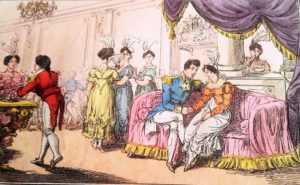 What did this mean for their families, especially the women? My novels are set against this backdrop of an off-stage war in a patriarchal world where women had few or no rights or opportunities and were open to abuse and exploitation by those whom society expected to protect them. They had very little security but were held to an impossibly high moral standard. There were only two sorts of women, good and bad, and a lost reputation could never be redeemed.
What did this mean for their families, especially the women? My novels are set against this backdrop of an off-stage war in a patriarchal world where women had few or no rights or opportunities and were open to abuse and exploitation by those whom society expected to protect them. They had very little security but were held to an impossibly high moral standard. There were only two sorts of women, good and bad, and a lost reputation could never be redeemed.
In my new novel, A Suggestion of Scandal, governess Rosa Fancourt remembers the day when her world crumbled around her. After her father’s death in battle, her mother had remarried. Now she, too, had died. Her father’s solicitor has called to Rosa’s school in Bath to break the news. He also tells her that her stepfather refuses to accept her into his household. From now on, she is on her own.
A Suggestion of Scandal opens eleven years later. Rosa, who has spent ten years as governess to Chloe Loring, is about to leave the Lorings’ employment. When she discovers two lovers in flagrante delicto, her life and future are suddenly at risk. Even if she escapes captivity, the mere suggestion of scandal is enough to ruin a lady in her situation. In Sir Julian Loring she finds an unexpected champion but will he stand by her to the end?
A Suggestion of Scandal is available worldwide from Amazon as eBook and paperback.

Catherine Kullmann was born and educated in Dublin. Following a three-year courtship conducted mostly by letter, she moved to Germany where she lived for twenty-six years before returning to Ireland. She has worked in the Irish and New Zealand public services and in the private sector.
Catherine’s debut novel, The Murmur of Masks, received a Chill with a Book Readers Award and was short-listed for Best Novel in the 2017 CAP (Carousel Aware Prize) Awards. Perception & Illusion received a Chill with a Book Readers Award and a Discovered Diamonds Award.
Be sure to learn more on Catherine's website and Facebook page.



The style of writing is remarkable and resembles true art in the way of words.